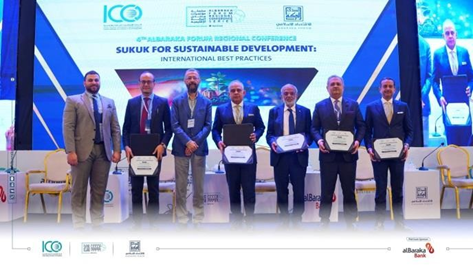Report by Muhammad Hammad
The AlBaraka Forum for Islamic Economy, in collaboration with the Islamic Chamber of Commerce and Development (ICCD), successfully held the 4th AlBaraka Forum Regional Conference on 29 January 2025 at Marriot Hotel Karachi, Under the theme “Sukuk for Sustainable Development: International Best Practices”.
During the opening ceremony, H.E Mr. Yousef Hassan Khalawi, Secretary General, AlBaraka Forum for Islamic Economy highlighted that the world has now spent more than a full century talking about sustainability. The Islamic world has 22 countries classified as least developed countries. We should focus on our nations and focus on our beliefs, as today we are trying to introduce Sukuk as one of our major initiatives created by Muslim economists, scientists, and experts.

Mr. Saleem, Deputy Governor of the State Bank of Pakistan, highlighted that the main Islamic finance principle is to be able to give the world a fair, just and equitable economic system. The capitalist system in most part of the world is not making the development sustainable. Islamic economic and financial system focuses on creating value, making sure that new resources are distributed equally so that income inequality is being addressed. Mr. Akif Saeed, Chairman of the Securities and Exchange Commission of Pakistan (SECP), highlighted that on the international stage, Sukuk has demonstrated its effectiveness as a financial instrument for sustainable development.
During the sessions of the 4th Albaraka Forum Regional Conference Series, Mr. Rehmat Ali Hasnie, President and Chief Executive Officer, the National Bank of Pakistan highlighted that the government’s support and security are crucial for transition, as progress will be slow or even impossible without them.
H.E Mr. Irfan Siddiqui, Founding President, and Chief Executive Officer, of Meezan Bank revealed that Meezan Bank along with other Islamic banks is working actively with MoF and SBP for regular issuance of Sukuk.

Mr. Syed Faraz Anwer, Partner Advisory and Consulting, PWC Pakistan shared optimism that the diversified representation of both Islamic and conventional banking industry in the conference could assist in the conversion process.
Mr. Muhammad Atif Hanif, Chief Executive Officer, Al Baraka Bank, Pakistan, highlighted that Sukuk has developed rapidly in recent years and now it has improved to 5 trillion rupees. Speaking about the challenges, Mr. Hanif, mentioned the requirements of the conventional banks and Islamic banks, besides the issue of debt raising for the government as the total domestic debt of Pakistan is now 47 trillion rupees, which used to be 26 trillion in 2021, and it is growing by average 20% every year.
Mr. Basir Shamsie, President & Chief Executive Officer, JS Bank highlighted some challenges, like the rupee devaluation, as hard currency investors are reluctant about it. He also mentioned limited amount of issuances and transactions as further challenges.
Mr. Ijlal Ahmed Alvi, Chief Executive Officer, and Secretary to The Board and Spokesperson of The International Islamic Financial Market emphasized that the consultative phase is the essential first step in any process, as it helps identify key issues and set the direction accordingly. Reflecting on 2008, Mr. Alvi highlighted the extensive discussions surrounding the legal behaviour of Sukuk and their ability to generate revenue, which underscored the critical need for transparency at the time.
Prof. Mohammad Kabir Hassan, Professor of Finance at the University of New Orleans – USA, and Hamid Habib Chair Professor at the Institute of Business Administration (IBA), highlighted that the challenge in the current Sukuk market is the regulatory harmonization. He also mentioned that there are technical gaps in knowledge from Shari’ah experts, as there is a shortage in Shari’ah structuring expertise.
Mr. Imtiaz Gadar, Chief Executive Officer, of Al Meezan Investment Management Limited, highlighted that one of the key challenges in meeting the rising demand for Sukuk is the paucity of clean tangible assets to back the prevalent Ijarah Sukuk structure, and an asset-light Sukuk can resolve this as issuance is not directly backed by tangible physical assets, but instead relies on alternative mechanisms like receivables, cash flows, or intangible assets.
Mufti Dr. Irshad Ahmad Aijaz, Chairman of the Shariah Advisory Committee, State Bank of Pakistan mentioned that it is easy to structure Sukuk in some regions than others.
Mr. Tariq Naseem, Head Islamic Finance Department, The Securities and Exchange Commission of Pakistan (SECP) highlighted that as a result of consultation, significant notes have been taken. Mr. Tariq also clarified that all sovereign Sukuk issued by the government of Pakistan are on a single Sukuk structure which is Ijarah Sukuk.
Categories: Articles on Islamic Finance



